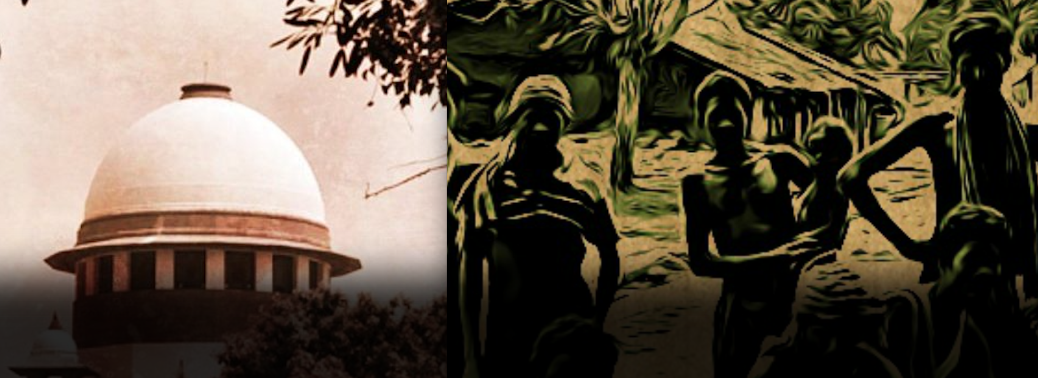SC on the Forest Rights Act
22, Feb 2019

Prelims level :
Mains level : GS 2: Welfare schemes for vulnerable sections of the population by the Centre and States and the performance of these schemes; mechanisms, laws, institutions and bodies constituted for the protection and betterment of these vulnerable sections
Supreme Court ordered state governments to evict over 10 lakh forest-dwelling families whose claims over forestland have been rejected, a direction that will hurt some of India’s most vulnerable people.
About:
- The order came in a case on the constitutional validity of the Forest Rights Act, which was passed in 2006 aiming to recognise and vest the forest rights and occupation in forest land in forest dwelling Scheduled Tribes and other traditional forest dwellers who have been residing in such forests for generations but whose rights could not be recorded.
- The case has dragged on for over 10 years under multiple benches, with the Supreme Court yet to answer questions on constitutional validity of the law.
Three grounds:
- There were at least three grounds on which the ministry could have challenged petitioners’ demand that forest claims be rejected and residents evicted.
- First, the petitioners ignored that the fact that Forest Rights Act says that no one should be evicted while the process of recording their rights is underway.
- Second, the order short-circuited the process laid down in the Act for those whose appeals have been rejected. Under the legisation, the government has to inform applicants why their claims have been rejected so that they can appeal the decision. Subsequently, evictions have to be carried out under the process defined by India’s forest laws.
- Third, the process of recognising rights has been poorly implemented. Of the 41 lakh claims filed so far, 18 lakh have been approved, 3 lakh are still being processed and the remaining 20 lakh have been rejected.Rejection does not always mean that the applicant’s case lacks merit. For most forest dwelling communities, the process of applying for an abstract notion like rights is daunting, activists pointed out.
- At the same time, states are wary of vesting forest rights since this could, among other things, complicate their ability to divert forest land for industrial activities. States have devised several strategies to reject applications.
- States like Jharkhand and Himachal Pradesh have refused to accept applications by Other Traditional Forest Dwellers – which is how the Act describes people of non-tribal origin who live in or depend on forests.
- Gujarat told applicants to submit, along with other evidence, satellite images of the land to which they were staking claim.
Long drawn-out case:
- Even when it was being drafted, the Forest Rights Act was criticised by the Union Environment Ministry and wildlife groups like Bombay Natural History Society, Wildlife Trust of India and Wildlife First. They said the Act would encourage further encroachment on India’s already battered forestlands.
- Land distribution falls under the legislative competence of state governments, so parliament could not distribute land through the Forest Rights Act.
- The case picked up pace sometime in 2016, when a bench headed by J Chelameswar began hearing the petitions.
- On January 29 that year, the Supreme Court said that it was obvious that vesting of rights under the Act is based “on an assertion that a claimant is in possession of a certain parcel of land” in the forests.
- Therefore, it said that if the claims were rejected, the claimant was to be evicted or other action proposed by the law should follow. It asked the states to file data on the number of claims rejected and what action they had taken.
- When the idea was proposed that those whose claims had been rejected should be evicted, Additional Solicitor General Narasimha shot it down, said the Supreme Court lawyer. “He asked what the court was adjudicating on,” the lawyer recalled.
- The case dragged on again, with states taking their time to file affidavits. Arguments on the main petition began only in September 2016 and extended into 2017.
- On March 31, 2017, the bench said that arguments of parties on parliamentary competence to enact the Act was complete but other points had to be argued. Records on the Supreme Court website show that the next significant order came in March 2018, when a new bench headed by Justice Madan B Lokur said that the data filed by the states had become outdated since two years had passed since they were put together. It asked for fresh data on rejected claims and action taken.
- By December 2018, there was another change in the bench with Justice Arun Mishra leading it in place of Justice Lokur. It is this bench that delivered the February 13 order asking the states to evict lakhs of forest dwellers whose claims have been rejected.
- By October last year, Narsimha had stepped down. After that, instead of creating a new legal team, the ministry left the matter to empanelled lawyers without giving them proper instructions






